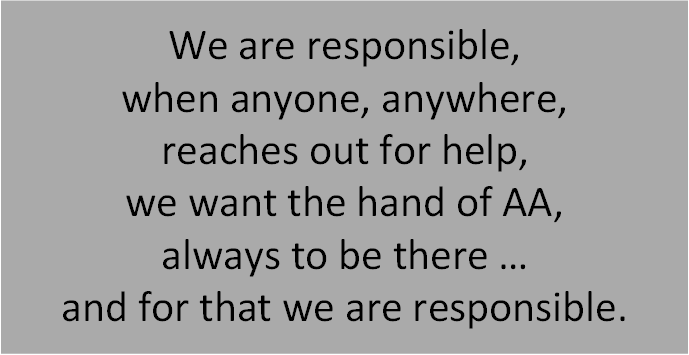Support of A.A. services, whether in the group, at local intergroup or central offices, areas, and even nationally through contributions to The General Service Board, has always been part of the spiritual foundation of Alcoholics Anonymous. As A.A. co-founder Bill W. wrote in 1957 “…when we are generous with the hat we give a token that we are grateful for our blessings and evidence that we are eager to share what we have found with all those who still suffer.” (The Language of the Heart, p. 21)
Today the quarterly contribution letters that go out to each group listed with the General Service Office try to outline the wide variety of services that the office is able to provide as a result of A.A. members being generous with the “hat.” For example, a letter that went out last year (2006) outlined to groups some of the services that their contributions made possible.
A.A. literature was able to be translated into Arabic, Bengali, Bosnian, Croatian, Hebrew, Hindi, Kazakh, and Turkish, among other languages, enabling the hand of A.A. to reach across language barriers.
Inmates in jails, prisons and other correctional facilities were able to be linked to outside A.A. members for correspondence that will help them stay in touch with a sober member in that one-on-one experience that is so vital to the recovery of every A.A. member.
A television public service announcement (P.S.A.) in which the still-suffering alcoholic may recognize himself or herself, followed by information on how to contact A.A. was made available for Public Information Committee service around the U.S. and Canada. Sometimes a bleary-eyed drinker gets a message of hope through these PSAs.
A.A. members who may be: working on a seagoing vessel for long periods; living in remote areas with no A.A. meetings; or confined to their homes by serious illness or physical incapacity are able to stay sober through correspondence and a bimonthly bulletin sent from the General Service Office.
G.S.O.’s Records Department continues to keep track of all those group trusted servants you tell us about, and to send them literature and material that may be useful in their Twelfth Step service. This includes G.S.R. kits, D.C.M. kits, Box 4-5-9 and other material that show up in group mailboxes.
The A.A. dollar makes possible exhibit space at national professional conferences in the U.S. and Canada, so that information about A.A. as a resource is made available to those professionals who may be the first to come into contact with the still-suffering alcoholic.
A.A. archivists in areas, districts, and intergroup/central offices around the U.S. and Canada receive Markings, the G.S.O. Archives newsletter that is an interchange for information and ideas. In addition, a new traveling exhibit that areas can order for their events and assemblies has been produced.
Recently a copy of the 1950 “Semi-Annual Request for Voluntary Contributions to the Alcoholic Foundation,” sent by Bill W., was circulated in the office. It began “To all A.A. Groups: Your A.A. Headquarters is still behind the eight-ball financially!” It went on to say: “Will you give us a hand? Your Foundation and the General service Office need help—right now. Despite some improvement in Group contributions this year over last, we are headed for a year end deficit of $25,000.”
Like in today’s quarterly contribution letters, Bill also explained some of the services that were supported by group contributions, but he was very direct about his expectations for those contributions. After giving some figures on contributions and expenses, he wrote: “To break even for 1950, it is therefore evident that your General Service Office will need $40,000 more than it now has before the year end. Therefore, I suggest that all Groups immediately raise their semi-annual contribution to the Alcoholic Foundation by at least 50%. Many groups could readily do better.” (underlining is original with the letter)
Bill also figured in that letter that “one fiftieth of one percent” of each A.A. member’s personal annual income—“nearly all of which is traceable to the fact we have found recovery in this beloved Society of ours— would be all it would take to give the next drunk his chance at life.”
At the beginning of that 1950 letter, Bill wrote: “Alcoholics Anonymous has three principal supports: The 12 Steps keep us alive and happy, the 12 Traditions hold us in unity, and our “Services” make it possible for A.A. to operate and grow. Eliminate the Recovery Steps and we die, eliminate the Traditions and we disintegrate, eliminate our Services and we shall fall into confusion and fail to function. It’s just like that.”
As published in
News and Notes from the General Service Office of A.A. ® Box 459 Vol. 53, No. 4 – Aug-Sep 2007




